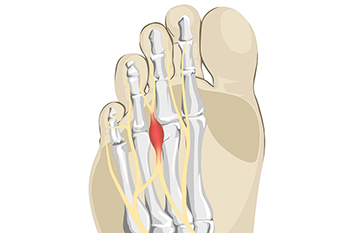
Intermetatarsal neuroma, or Morton’s neuroma, refers to a thickening of nerve tissue surrounding a nerve in the foot that is compressed or irritated. This compression can be the result of wearing high heels or other shoes that force the toes unnaturally into a narrow space. Morton’s neuroma typically occurs between the third and fourth toes. Engaging in certain athletic activities, like court sports or running, can also cause repetitive irritation to the nerves between the toes. Symptoms of Morton’s neuroma include pain, or the sensation of something being under the ball of the foot. There may be numbness, burning, or tingling, or it may feel like there is a bunched up sock or pebble in the front of the shoe. As the neuroma progresses over time, the pain may worsen and permanent nerve damage may occur. That is why it is very important to have your foot examined by a podiatrist if you believe you may have Morton’s neuroma. The earlier the diagnosis, the more likely it is that your podiatrist can treat the issue conservatively, rather than surgically.
Morton’s neuroma is a very uncomfortable condition to live with. If you think you have Morton’s neuroma, contact our podiatrists of CNY Foot Surgery & Podiatry Care. Our doctors will attend to all of your foot care needs and answer any of your related questions.
Morton’s Neuroma
Morton's neuroma is a painful foot condition that commonly affects the areas between the second and third or third and fourth toe, although other areas of the foot are also susceptible. Morton’s neuroma is caused by an inflamed nerve in the foot that is being squeezed and aggravated by surrounding bones.
What Increases the Chances of Having Morton’s Neuroma?
- Ill-fitting high heels or shoes that add pressure to the toe or foot
- Jogging, running or any sport that involves constant impact to the foot
- Flat feet, bunions, and any other foot deformities
Morton’s neuroma is a very treatable condition. Orthotics and shoe inserts can often be used to alleviate the pain on the forefront of the feet. In more severe cases, corticosteroids can also be prescribed. In order to figure out the best treatment for your neuroma, it’s recommended to seek the care of a podiatrist who can diagnose your condition and provide different treatment options.
If you have any questions, please feel free to contact our office located in East Syracuse, NY . We offer the newest diagnostic and treatment technologies for all your foot care needs.



